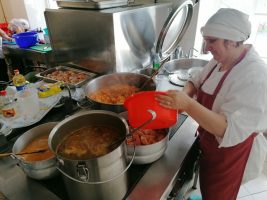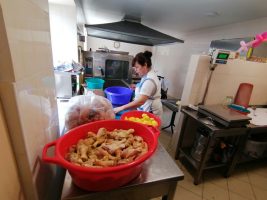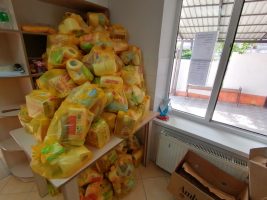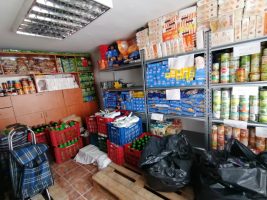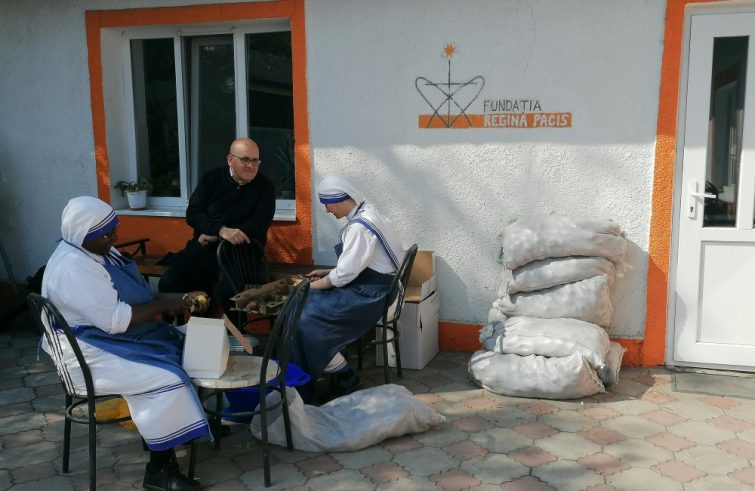
(From Chișinău) The ‘Pope Francis soup kitchen’ is located at 17, Avram Iancu, in the heart of Chișinău, a short walk from the market where Moldovans from all over the country come to sell their products. The entrance gate opens to a truckload of foodstuffs. This is a day when the trucks arrive to unload the goods, but next-door neighbours say that it happens all the time.
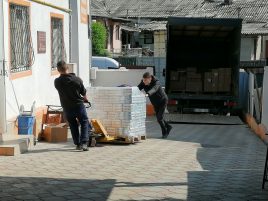 It couldn’t be otherwise as the soup kitchen tends to the basic needs of over two hundred families every day. A further 50 who have mobility problems receive their food parcels at home. Since the arrival of Ukrainian refugees, who fled the war, the service’s schedule has been adjusted accordingly. The first part of the morning is reserved for Moldovan destitute persons, while the Ukrainian families that fled the war arrive after midday. The large indoor kitchen is already in full swing. Chicken broth, pasta, fried chicken and potatoes are almost ready to be served. The menu often features dishes combining local and Italian recipes. Sister Andrea, from Africa, and Sister Ester, from Romania, both missionaries of Mother Teresa’s Charity, are busy peeling potatoes in the courtyard. It might take a long time, given the number of potato sacks, and yet they smile throughout the process. Two young Italians from Milan, doing their community service, and a voluntary worker from Turin, are next to the kitchen, preparing personal hygiene kits for those arriving at the soup kitchen. Meanwhile, pallets of sugar are being loaded into the warehouse.
It couldn’t be otherwise as the soup kitchen tends to the basic needs of over two hundred families every day. A further 50 who have mobility problems receive their food parcels at home. Since the arrival of Ukrainian refugees, who fled the war, the service’s schedule has been adjusted accordingly. The first part of the morning is reserved for Moldovan destitute persons, while the Ukrainian families that fled the war arrive after midday. The large indoor kitchen is already in full swing. Chicken broth, pasta, fried chicken and potatoes are almost ready to be served. The menu often features dishes combining local and Italian recipes. Sister Andrea, from Africa, and Sister Ester, from Romania, both missionaries of Mother Teresa’s Charity, are busy peeling potatoes in the courtyard. It might take a long time, given the number of potato sacks, and yet they smile throughout the process. Two young Italians from Milan, doing their community service, and a voluntary worker from Turin, are next to the kitchen, preparing personal hygiene kits for those arriving at the soup kitchen. Meanwhile, pallets of sugar are being loaded into the warehouse.
- Chișinău, mensa Papa Francesco (foto Sir)
- Chișinău, mensa Papa Francesco (foto Sir)
- Chișinău, mensa Papa Francesco (foto Sir)
- Chișinău, mensa Papa Francesco (foto Sir)
- Chișinău, mensa Papa Francesco (foto Sir)
Monsignor Cesare Lodeserto, vicar general of the diocese of Chișinău, has set up a veritable “assembly line” of solidarity, whose “Pope Francis soup kitchen” is but one component. “The soup kitchen, – the Salento-born priest who has been living in Moldova for years and has since acquired citizenship there – was among the first, if not the very first, soup kitchen run by the Catholic Church in the country. It forms part of the ‘Regina Pacis’ foundation connected to the diocese, of which I am the registered representative. We run a soup kitchen also in northern Moldova, as well as three family housing centres, two social housing facilities for the homeless, a vocational training centre in juvenile prisons – the only one in the Republic of Moldova – and various activities carried out in coordination with the Ministry of Justice aimed at alleviating the hardships of former prisoners who have been released after serving their sentences for crimes such as drug addiction and domestic violence. In addition, the National Caritas runs health and education projects, Optima Fide, a humanitarian agency of the Greek Catholic Church is devoted to recovering alcoholics and drug addicts, while the House of Providence offers social activities. The bishop of Chişinău, Monsignor Anton Cosa, strongly supported the creation of this major charity network as a sign of practical closeness to destitute persons.”
“The Pope Francis soup kitchen is a token of the local Catholic Church’s commitment to respond to the needs of the people of this country – among the poorest in the Old Continent. This structural poverty has been further aggravated by the pandemic and by the war in Ukraine”, the priest said. Notwithstanding all present difficulties, the soup kitchen continues to offer its services and to carry out its mission according to a “family-based charity” style, which Msgr. Lodeserto explains as follows:
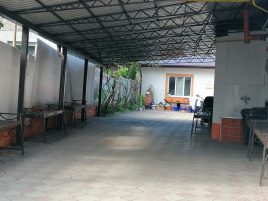 “People do not come here to sit, eat and leave. For the local culture such a thing would be humiliating. People coming here represent all walks of life, including former politicians, professors, civil servants, employees who became poor as a result of the crisis, along with unemployed citizens, vulnerable persons and refugees. None of them should be stripped of the dignity they deserve, which is why we don’t serve meals but give them what they need to eat, which can be either pre-cooked or uncooked, for them to take home and eat with their families. When necessary, we also provide medicine, clothes and hygiene kits.” In a nutshell, reiterates the vicar general,
“People do not come here to sit, eat and leave. For the local culture such a thing would be humiliating. People coming here represent all walks of life, including former politicians, professors, civil servants, employees who became poor as a result of the crisis, along with unemployed citizens, vulnerable persons and refugees. None of them should be stripped of the dignity they deserve, which is why we don’t serve meals but give them what they need to eat, which can be either pre-cooked or uncooked, for them to take home and eat with their families. When necessary, we also provide medicine, clothes and hygiene kits.” In a nutshell, reiterates the vicar general,
“for us the soup kitchen is not about giving food but life.”
“Charity that fills the stomach can be done in many ways, but if it fills many people’s lives it becomes extremely meaningful. Our soup kitchen is a place where people can meet and feel that they are important to us and that we love them. This can also be achieved through cooking and food, which foster relationships and encounters by providing an additional human dimension.” According to Monsignor Lodeserto, if ever there were a motto that embodied the mission of this soup kitchen in the centre of Chișinău, it would be
“I am looking for friends over a piece of bread”. We must ensure that the piece of bread becomes a meeting place for lasting friendships. That is the message of the Eucharist: the Body of Christ is the meal where friends are united. The soup kitchen is the charity that flows from the Gospel.”

